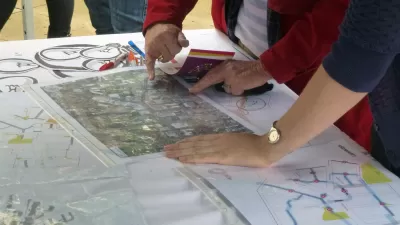The AICP exam has been revised for May 2017. Here's some insight into the changes and links to resources that can help candidates prepare for the exam.

The American Planning Association (APA) has updated its American Institute of Certified Planners (AICP) Exam for 2017. Every few years, the APA reviews the exam and makes updates with the help of professional planners, who prepare questions for inclusion on the exam.
The 2017 version of the exam includes several key changes prospective exam takers should be aware of. To start, AICP simplified the number of topics and provided greater clarity in the topics included on the exam. Most of the topics on the last exam are still on the new exam. AICP offers an outline of the exam's subject matter online. The updated exam increased the importance of ethics, based on the new AICP Code of Ethics. That section now represents 10 percent of the exam.
AICP has 800 questions in its AICP exam question bank. AICP reviewed all of the questions and developed approximately 100 new questions, which are replacing the same number of old questions on the exam. It's important to note is that participants will experience no more than 20 new questions on the exam. However, these questions will not be graded. These are used for pre-testing to make sure the questions perform as expected. That said, new questions were added two years ago, and these questions are now ready to be included in the graded portion of the exam.
The passing score for the AICP exam is not determined until after people have taken the exam. A committee will be convened to review responses and develop the scaled score. For the past exam the pass score was a 55. That passing score will change, however, and will not be determined until after the exam.
Because the pass score has not been determined then test takers will receive a score report when they take the exam. Then 6-8 weeks later, test takers will receive a letter in the mail notifying candidates on if they have passed the exam.
There are many courses and materials available to assist candidates as they prepare for the exam. Be sure to note whether the materials are updated for the 2017 exam, or whether they are for a previous exam. Those for a previous exam are still be helpful, but will not fully reflect the revised exam.
- Planetizen offers an AICP Exam Preparation course reflects the 2017 revised AICP exam and its subject outline. For example, the practice exams reflect the weighting of subjects on the revised exam, as well as the addition of new practice questions that reflect new topics. New lessons have been added reflecting the new AICP reading list, as well as new video content.
- The APA has an AICP Exam 3.0 preparation course that was created in 2014 for the previous version of the exam and is providing users with a “crosswalk” that explains to users how the 2014 AICP 3.0 course lessons and apply them to the new exam.
- The APA has made the planning advisory service reports available for members via the website. These are very useful and are reflected on the revised AICP exam.
- Several APA chapters provide AICP Exam preparation materials from previous exam cycles, such as Treasure Coast, Texas, and Pennsylvania.
- Planningprep.com has a database of practice questions that reflect the previous exam. This is a helpful resource for example questions.
I know it is challenging being in the first class preparing for a revised exam. As the instructor for the Planetizen AICP Exam Preparation Course, I will do everything I can to help you as you prepare for the AICP Exam. If you have useful suggestions on preparing for the AICP exam, feel free to share below.

Study: Maui’s Plan to Convert Vacation Rentals to Long-Term Housing Could Cause Nearly $1 Billion Economic Loss
The plan would reduce visitor accommodation by 25,% resulting in 1,900 jobs lost.

North Texas Transit Leaders Tout Benefits of TOD for Growing Region
At a summit focused on transit-oriented development, policymakers discussed how North Texas’ expanded light rail system can serve as a tool for economic growth.

Using Old Oil and Gas Wells for Green Energy Storage
Penn State researchers have found that repurposing abandoned oil and gas wells for geothermal-assisted compressed-air energy storage can boost efficiency, reduce environmental risks, and support clean energy and job transitions.

Santa Barbara Could Build Housing on County Land
County supervisors moved forward a proposal to build workforce housing on two county-owned parcels.

San Mateo Formally Opposes Freeway Project
The city council will send a letter to Caltrans urging the agency to reconsider a plan to expand the 101 through the city of San Mateo.

A Bronx Community Fights to Have its Voice Heard
After organizing and giving input for decades, the community around the Kingsbridge Armory might actually see it redeveloped — and they want to continue to have a say in how it goes.
Urban Design for Planners 1: Software Tools
This six-course series explores essential urban design concepts using open source software and equips planners with the tools they need to participate fully in the urban design process.
Planning for Universal Design
Learn the tools for implementing Universal Design in planning regulations.
Ascent Environmental
Borough of Carlisle
Institute for Housing and Urban Development Studies (IHS)
City of Grandview
Harvard GSD Executive Education
Toledo-Lucas County Plan Commissions
Salt Lake City
NYU Wagner Graduate School of Public Service






























